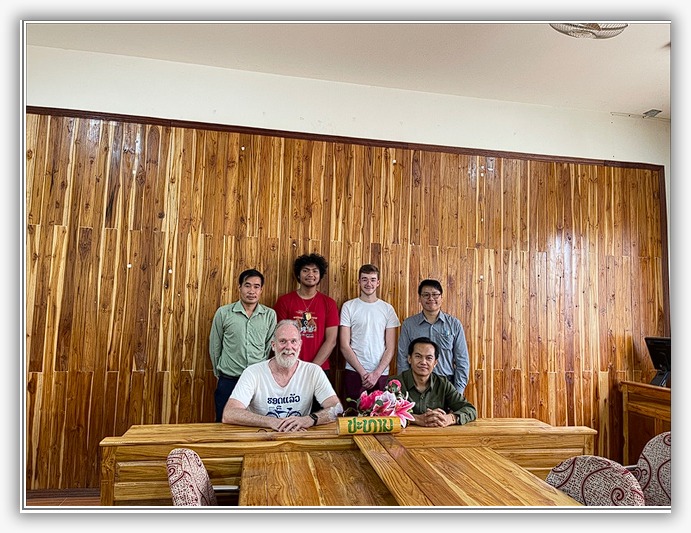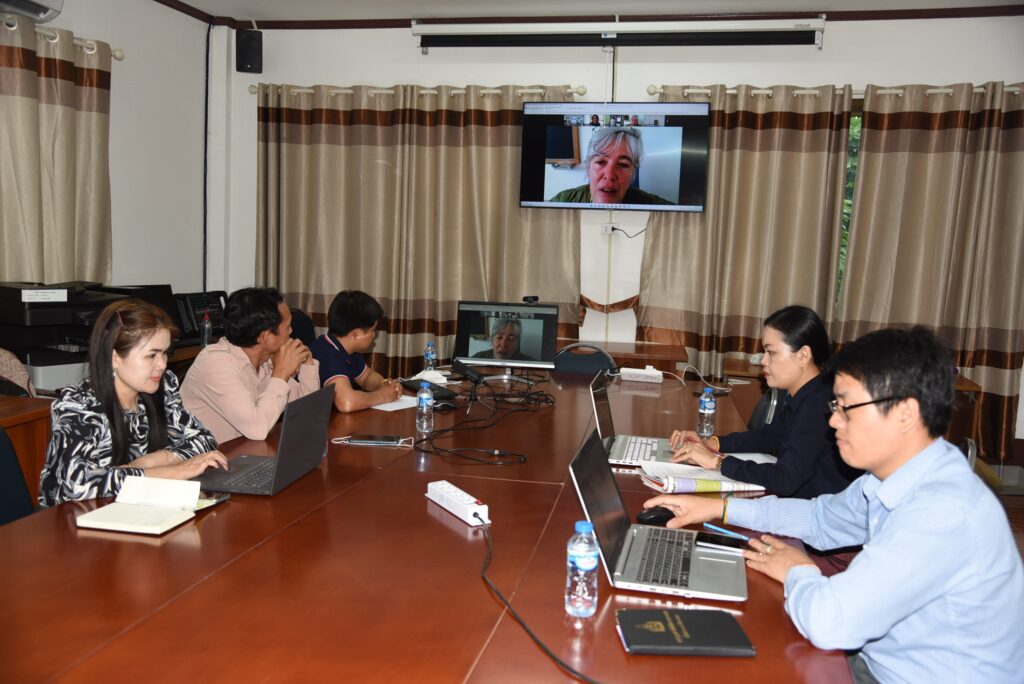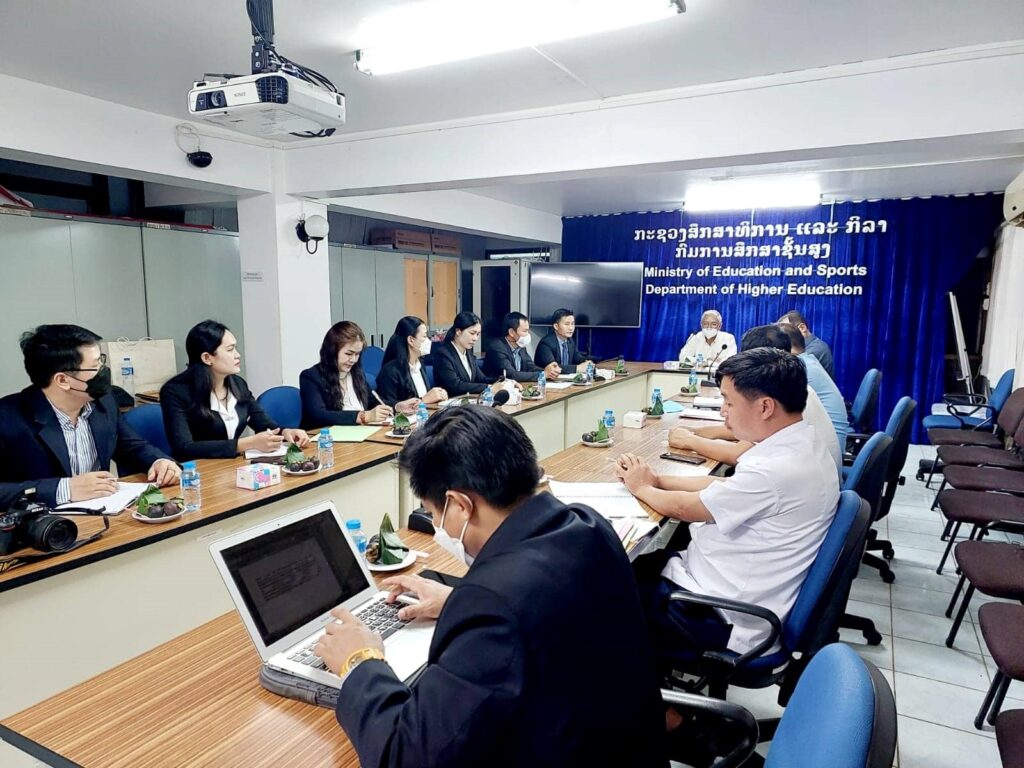THE FIRST ACHIEVEMENT OF A UNIQUE ACADEMIC AND SCIENTIFIC COOPERATION BETWEEN THE UNIVERSITY OF SOUPHANOUVONG AND THE UNIVERSITY OF TOURS
Anousith Vannaphon, University of Souphanouvong
Marc Desmet, University of Tours
A FRAMEWORK AGREEMENT BETWEEN THE UNIVERSITY OF TOURS AND THE UNIVERSITY OF SOUPHANOUVONG
As part of the Dear Water project in Luang Prabang, the University of Tours and the University of Souphanouvong have signed a framework cooperation agreement, the first with a French higher education and research institution. It was a long-term process since the idea emerged in the middle of the pandemic.
Prof. Vixay CHANSAVANG †, President of the University of Souphanouvong until 2023 worked hard for this academic cooperation. We are deeply grateful to him and his team in charge of international relations ; a Memorandum of Understanding has been established in early 2024.
A COOPERATION PROGRAM IN THE FIELD OF WATER MANAGEMENT
The agreement aims to strengthen the capacities of the University of Souphanouvong in the field of water management and more generally the environment. Currently, there are no teacher-researchers and students trained in the challenges of water resources; however, the needs are huge, particularly with regards to the climate change and human impact, which cause periods of severe low water and critical drought.
The Faculty of Agriculture and Forest Resources, its dean Dr. Vongpasith CHANTHAKHOUN (photo 2) as well as Anousith VANNAPHON (Photo 3), a Lecturer within this faculty, have been largely involved to ensure that the University of Tours can help them in their project to create a teaching department and a laboratory dedicated to the engineering of aquatic environments
WATER QUALITY ANALYSIS IN URBAN CANALS
The city of Luang Prabang discharges the wastewater into the natural environment. Domestic and industrial water therefore flows directly into the Mekong River without any treatment. Nevertheless, the occurrence of a lot of ponds makes it possible to limit the impact of this pollution very slightly (photo 4).
Joint monitoring trip between the two French and Lao universities enabled to assess the sources and levels of pollution in urban canals, mainly in the Ban Mano district.
One can be concluded that the construction project carried out during the 2010’s to export the contaminated water to the Mekong is only of interest if they are collected and treated before discharge into the natural environment.
In the Nam Dong watershed, there is evidence of a gradient between the Nam Duai stations and the one at the confluence with the Mekong River (Photo 5). So, the microbial concentration is on average ten times lower than those of Ban Mano: the flow of natural water significantly lowers the levels of fecal bacteria. But these initial observations should be treated with caution.
Regarding water for domestic use, it should be noted tap water provides high values despite treatments carried out in the stations where the water is pumped from the Nam Khan. It seems the water supply network is affected by biofilms that colonize the supply pipes.
The irrigation water collected from the aquifer remains in line with the groundwater values of alluvial aquifers. Local water treatment therefore remains the most effective practice for the control and elimination of bacterial flora in domestic water.
Remote water (upstream of the Nam Na Duai River) was the subject of a specific study dedcicated to the performance of filters intended to make spring or river water drinkable (Photos 6 and 7). Measurements of microbiological activity were carried out before and after filtration under real conditions and without any specific preparation. The total bacterial flora is 50 times lower in one case (Orisa filtering) and 8 times lower in the other (Soap4life device).
TRAINING THROUGH RESEARCH AND FOR RESEARCH
Teaching and tutoring colleagues at the University of Souhanouvong in hydrogeology is a major challenge since we expect the University of Souphanouvong will be able to carry out its own project concerning the water management and the environment. This higher education and research institution will be capable to disseminate the scientific knowledge regarding hydrogeology.
For example, student interns from the University of Tours and the Lecturer from the University of Souphanouvong, newly trained in aquatic environment engineering, coached in 2023 the technical services of the City of Luang Prabang for the development of a wastewater analysis laboratory (photo 8). They also organized field trainings for Lao and foreign students visiting Souphanouvong University (photo 9).
The next step of our joint project will be to provide regular training on water issues. The objective is to ensure that Lao teacher-researchers can themselves train their own students at the end of the project, in 2027.
ACKNOWLEDGEMENT
This project has been funded by the French Development Agency and the University of Tours.
We are grateful to the Region Centre Val de Loire, CONFLUENCE, GRET, Loire Bretagne Water Agency and the French Embassy in Ventiane for their support and cooperation and Souphanouvong University.




